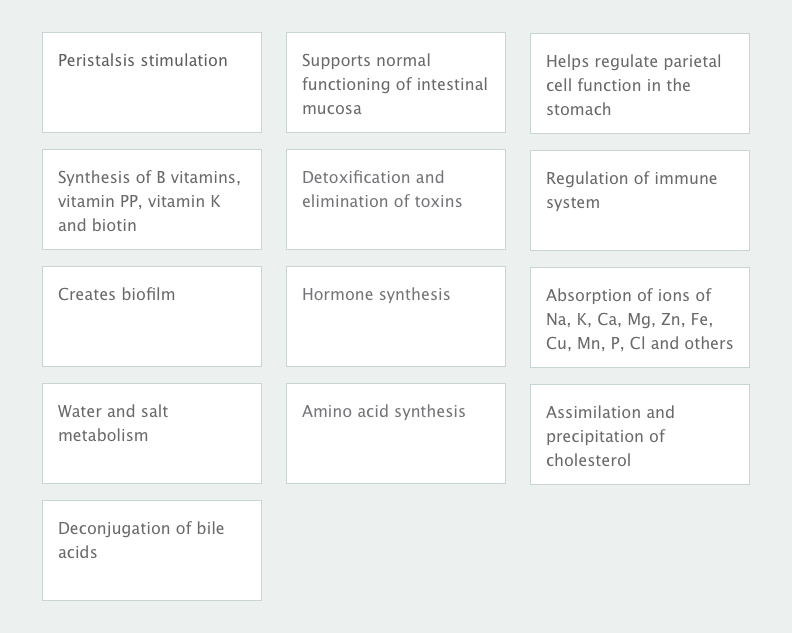Studies carried out in recent years have shown how extremely important the microbial community is for human health.[1, 2, 3, 4] The qualitative and quantitative composition of intestinal microbiota is affected by a large number of factors, including diet and lifestyle. Malfunctions of the intestinal microflora worsen the response of the immune system, enable the development of metabolic disorders and cause allergic reactions.[3, 4] Using modern diagnostic methods, it is possible to fully uncover the gene function of numerous representatives of intestinal microflora. Studies are carried out in an attempt to discover the connection between malfunctions in changes of the microbiota and various human diseases. The profile of the intestinal community is different in every individual but 75% of it consists of the bacteria Verrucomicrobia, Firmicutes, Bacteroides, Fusibacteria, Proteobacteria and Actinobacteria,[5] and it is determined by the gene name of the individual concerned.[6] Human health and general homeostasis are enabled by some of the most important representatives of Gram-positive anaerobic microflora – lactobacilli and bifidobacteria. If there are enough of these, they effectively prevent colonisation of the intestine by foreign microflora.[7] The gut microbiome also influences the functioning of the microbiota–gut–brain axis by stimulating the functioning of non-specific immunity and the endocrine, nervous and immune system.[8]
Photo 1 Normal intestinal microflora function[11]

Numerous endocrine and psychovegetative disorders are linked to magnesium deficiency and abnormal magnesium absorption in the organism.[9] In a study we conducted between 2013 and 2016, we found, through instrumental observation and during laboratory and clinical observations of children and teenagers (134 subjects aged between 10 and 18), that magnesium deficiency is linked to functional constipation.[10] Disorders of energetic, neurochemical and metabolic processes in the cells of the central and vegetative nervous system cause disorders in the psyche, the emotions and adaptation processes, and subsequently cause functional disorders in the form of constipation. In the above category of patients, drinking a total daily quantity of 300 to 500 ml of Donat medicinal mineral water three times a day 20 minutes before meals over a period of 18 days stabilised the functioning of the gastrointestinal tract, improved the possibilities of functioning of the central and vegetative nervous system and strengthened the adaptive capacities of the organism, all of which stabilised the homeostasis and dynamic balance of the gut–brain axis.

References
- Borre Y.E., Moloney R.D., Clarke G., Dinan T.G., Cryan J.F. The impact of microbiota on brain and behavior: mechanisms and therapeutic potential // Adv. Exper. Med. Biol., 2014, I. 817, P. 373–403.
- Young V.B. The intestinal microbiota in health and disease // Opin. Gastroenterol., 2012, I. 28, P. 63–69.
- Tilg H., Kaser A. Gut microbiome, obesity, and metabolic dysfunction // J. Clin. Invest., 2011, I. 121, P. 2126–2132.
- Kelsen J.R., Wu G.D. The gut microbiota, environment and diseases of modern society // Gut Microbes, 2012, I. 3, P. 374–382.
- Arumugam M., Raes J., Pelletier E., Le Paslier D., et al. Enterotypes of the human gut microbiome // Nature, 2011, I. 473, P. 174–180.
- Turnbaugh P.J., Hamady M., Yatsunenko T., Cantarel B.L., Duncan A., Ley R.E., Sogin M.L., Jones W.J., Roe B.A., Affourtit J.P., Egholm M., Henrissat B., Heath A.C., Knight R., Gordon J.I. A core gut microbiome in obese and lean twins // Nature, 2009, I. 457, P. 480–484.
- Vandenplas Y., Huys G., Daube G. Probiotics: an update // J. Pediatr. (Rio J.), 2015, I. 91, P. 6–21.
- Stilling R.M., Dinan T.G., Cryan J.F. Microbes do have a significant impact on epigenetic regulation in the host’s gut epithelium and immune system, microbial genes, brain and behaviour-epigenetic regulation of the gut-brain axis // Genes Brain Behav., 2014, I. 13, P. 69–86.
- Семиголовский Н.Ю. Дефицит магния как общемедицинская проблема. Трудный пациент. 2008;7: 31–35.
- Захарова И.Н. Роль дефицита магния в формировании функционального запора у детей и подростков / И.Н. Захарова, Т.М. Творогова, Л.Л. Степурина, Л.И. Елезова // Медицинский совет. – 2019. – №11. – С. 16–24.
- Romanchuk N.P., Romanchuk P.I. (2019). Neurophysiology and neurorehabilitation of cognitive disorders and disorders // Bulletin of Science and Practice, I. 5(11), P. 176–196. (https://doi.org/10.33619/2414-2948/48/19 (in Russian)).
Choose chapter:






